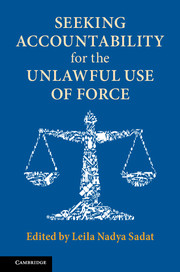Book contents
- Frontmatter
- Dedication
- Contents
- Notes on Contributors
- Foreword
- Preface
- Table of Cases
- Introduction
- PART I HISTORIC AND CONTEMPORARY PERSPECTIVES ON THE UNLAWFUL USE OF FORCE
- PART II MECHANISMS FOR RESTRAINING THE UNLAWFUL USE OF FORCE AND ENHANCING ACCOUNTABILITY
- PART III THE ILLEGAL USE OF FORCE AND THE PROSECUTION OF INTERNATIONAL CRIMES
- PART IV IMAGINING A BETTER WORLD
- 17 Rethinking the Relationship Between Jus in Bello and Jus ad Bellum: A Dialogue Between Authors
- 18 Twenty-First Century Paradigms on Military Force for Humane Purposes
- 19 The Presumption of Peace: Illegal War, Human Rights, and Humanitarian Law
- 20 The Urgent Imperative of Peace
- Epilogue
- Index
19 - The Presumption of Peace: Illegal War, Human Rights, and Humanitarian Law
from PART IV - IMAGINING A BETTER WORLD
Published online by Cambridge University Press: 21 May 2018
- Frontmatter
- Dedication
- Contents
- Notes on Contributors
- Foreword
- Preface
- Table of Cases
- Introduction
- PART I HISTORIC AND CONTEMPORARY PERSPECTIVES ON THE UNLAWFUL USE OF FORCE
- PART II MECHANISMS FOR RESTRAINING THE UNLAWFUL USE OF FORCE AND ENHANCING ACCOUNTABILITY
- PART III THE ILLEGAL USE OF FORCE AND THE PROSECUTION OF INTERNATIONAL CRIMES
- PART IV IMAGINING A BETTER WORLD
- 17 Rethinking the Relationship Between Jus in Bello and Jus ad Bellum: A Dialogue Between Authors
- 18 Twenty-First Century Paradigms on Military Force for Humane Purposes
- 19 The Presumption of Peace: Illegal War, Human Rights, and Humanitarian Law
- 20 The Urgent Imperative of Peace
- Epilogue
- Index
Summary
INTRODUCTION
On September 11, 2015, world headlines were focused on people fleeing war rather than the anniversary of terrorist attacks in the United States fourteen years earlier. In Europe, men, women, and children were drowning, suffocating, and freezing in desperate attempts to escape civil wars in Africa, the Middle East, and South Asia. No greater proof could be provided of the urgent need for peace. Yet, instead of seeking to enhance the capacity of law and diplomacy to prevent and end armed conflict, some experts in militarily powerful States were arguing for interpretations of law and moral principle permitting more war, not less. These experts sought relaxation of the rules restricting resort to military force or the right to follow wartime rules governing killing and detention to peacetime situations. Their positions may well be based on a sincerely held belief that military force is the most effective way to respond to terrorism, dictatorial regimes, and other causes of insecurity. Prominent ethicists are making a similar case for expanding resort to war for similar reasons. Yet, in the words of a former British diplomat, “governments’ failed attempts to impose order by force are themselves the source of disorder.”
In the search for bold action in the face of serious challenges, it can be overlooked that war is in fact the cause of tragedy not the solution. Protecting human lives and the natural environment from the ravages of war can best be accomplished by promoting restrictions on force and peaceful resolution of conflict. The contemporary civil wars in Syria, Iraq, Libya, Afghanistan, Congo, Burundi, and elsewhere are feeding the flood of migrants. These wars need resolution not escalation through foreign military intervention. It will be argued here that however understandable the calls for greater military force may be, war is rarely the answer. Fostering understanding and respect for law and even expanding restrictions to prohibit civil war hold greater promise. The recent trend toward interpreting the scope of peacetime human rights protections to apply more broadly is an important counterpoint to warexpansion arguments.3 Expanding human rights follows the plan of the World War II generation to save succeeding generations from the scourge of war through law and moral suasion.
- Type
- Chapter
- Information
- Seeking Accountability for the Unlawful Use of Force , pp. 526 - 547Publisher: Cambridge University PressPrint publication year: 2018



